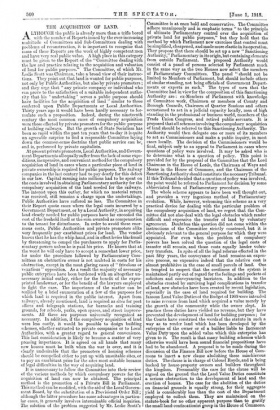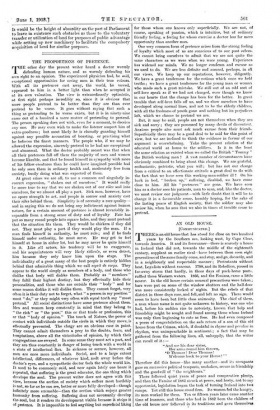THE ACQUISITION OF LAND.
A LTHOUGH the public is already more than a trifle bored _in- with the number of Reports issued by the ever-increasing multitude of Committees and Sub-Committees dealing with problems of reconstruction, it is important to recognize that some of these Reports are the work of highly competent men and have very real public value. A high place in this category must be given to the Report of the " Committee dealing with the law and practice relating to the acquisition and valuation of land for public purposes." The Committee, of which Mr. Leslie Scott was Chairman, take a broad view of their instruc- tions. They point out that land is wanted for public purposes, not only by Public Authorities, but also by private promoters ; and they urge that " any private company or individual who can prove to the satisfaction of a suitable independent autho- rity that his ` undertaking ' serves a public purpose should have facilities for the acquisition of land " similar to those conferred upon Public Departments or Local Authorities. Thirty years ago it would have been hardly necessary to for- mulate such a proposition. Indeed, during the nineteenth century the most common cases of compulsory acquisition were those effected by private promoters for the public purpose of building railways. But the growth of State Socialism has been so rapid within the past ten years that to-day it is quite an agreeable surprise to find a responsible Committee laying down the common-sense doctrine that public service can be, and is, performed by private capitalists. At present private promoters, Local Authorities, and Govern- ment Departments all equally suffer from the lack of some expe- ditious, inexpensive, and convenient methodfor the compulsory acquisition of land in cases where a particular piece of land in private ownership is required for public purposes. The railway companies in the last century had to pay dearly for this defect in our law. Capital running into millions had to be spent on the costs involved in obtaining Parliamentary authority for the compulsory acquisition of the land needed for the railways.
The interest upon this outlay, for which no material return was received, still remains a charge upon the undertakings.
Public Authorities have suffered no less. The Committee in their Report quote cases where the legal costs incurred by a Government Department, or by a Local Authority, in acquiring land clearly needed for public purposes have far exceeded the cost of the freehold itself or the sum awarded as compensation to the tenant for disturbance. In order to avoid these enor- mous costs, Public Authorities and private promoters alike very frequently pay exorbitant prices for land. The vendor knows that he has the whip-hand, and in effect levies blackmail by threatening to compel the purchasers to apply for Parlia- mentary powers unless he is paid his price. He knows that at the worst he will only have to accept a somewhat lower price, for under the procedure followed by Parliamentary Com- mittees an obstructive owner is not mulcted in costs for his obstruction, except in the most glaring cases of " frivolous or vexatious " opposition. As a result the majority of necessary public enterprises have been burdened with an altogether un- necessary initial outlay, either for the benefit of the expro- priated landowner, or for the benefit of the lawyers employed to fight the case. The importance of the matter can be realized by a brief enumeration of a few of the purposes for which land is required in the public interest. Apart from railways, already mentioned, land is required as sites for post offices and telegraph stations, for barracks and training grounds, for schools, parks, open spaces, and street improve- ments. All these are purposes universally recognized as necessary. In addition, if the compulsory acquisition of land were less costly, it would be possible to design building schemes, whether entrusted to private companies or to Local Authorities, with a greater regard to general convenience.
This last consideration is likely to become a matter of very pressing importance. It is agreed on all hands that many new houses must be built when the war is over, and it is clearly undesirable that the promoters of housing schemes should be compelled either to put up with unsuitable sites, or to pay an exorbitant price for the sites most suitable because of legal difficulties in the way of acquiring land. It is unnecessary to follow the Committee into their review of the various methods by which compulsory powers for the acquisition of land can now be obtained. The principal method is the promotion of a Private Bill in Parliament. This method can be modified, with the aid of the Local Govern- ment Board, by the substitution of a Provisional Order Bill ; although the latter procedure has some advantages in particu- lar cases, it generally involves interminable official inquiries. The solution of the problem suggested by Mr. Leslie Scott's Committee is at once bold and conservative. The Committee adhere unanimously and in emphatic terms " to the principle of ultimate Parliamentary control over the acquisition of private land for public purposes," but they hold that the method by which Parliament now exercises that control must be simplified, cheapened, and made more elastic in its operation. They propose that there should be set up a new " Sanctioning Authority," Parliamentary in its origin, but containing elements from outside Parliament. The proposed Authority would consist of a panel of persons selected by Parliament much in the same way as the two Houses now select the members of Parliamentary Committees. The panel " should not be limited to Members of Parliament, but should include others of similar standing, not being officials of Government Depart- ments or experts as such." The types of men that the Committee had in view for the composition of this Sanctioning Authority are : ex-Members of Parliament with knowledge of Committee work, Chairmen or members of County and Borough Councils, Chairmen of Quarter Sessions and others accustomed to act in a judicial capacity locally, men of high standing in the professional or business world, members of the Trade Union Congress, and retired public servants. It is proposed that all schemes involving the compulsory acquisition of land should be referred to this Sanctioning Authority. The Authority would then delegate one or more of its members to act as Commissioners and make a public inquiry, in most cases locally. The decision of the Commissioners would be final, subject only to an appeal to Parliament in cases where questions of policy were involved. It may be asked who is to determine what is a question of policy. This point is provided for by the proposal of the Committee that the Lord Chairman in the House of Lords, the Chairman of Ways and Means in the House of Commons, and the Chairman of the Sanctioning Authority should constitute the necessary Tribunal. If this Tribunal decided that a question of policy was involved, the point would be referred to Parliament for decision by some abbreviated form of Parliamentary procedure. The whole scheme appears to have been well thought out, and provides a very ingenious method of Parliamentary evolution. While, however, welcoming this scheme as a very practical device for dealing with the particular problem of the compulsory acquisition of land, we regret that the Com- mittee did not also deal with the legal obstacles which render difficult and expensive the transfer of land by voluntary agreement. Doubtless this question did not come within the instructions of the Committee strictly construed, but it is obviously relevant to the general purpose for which they were appointed. For even when the problem of compulsory powers has been solved the question of the legal costs of transfer still remain, and those costs equally hinder volun- tary transfers. In spite of all the legal reforms effected in the past fifty years, the conveyance of land remains an expen- sive process, so expensive indeed that the relative cost is almost prohibitive in the case of small parcels of land. One is tempted to suspect that the costliness of the system is maintained partly out of regard for the feelings and pockets of solicitors and conveyancing barristers. In addition to the obstacles created by surviving legal complications in transfer of land, new obstacles have been created by recent legislation, especially in the case of land required for building. The famous Land Value Duties of the Budget of 1909 were intended to raise revenue from land which acquired a value merely by the growth of the community while the owner slept. In practice these duties have yielded no revenue, but they have prevented the development of land for building purposes ; for the Courts have construed the words of the statute in such a way as to render land which has been developed by the enterprise of the owner or of a builder liable to Increment Value Duty upon the added value which this enterprise has given to it. The result is that many building schemes which otherwise would have been sound financial propositions have had to be abandoned. A proposal is to be made during the discussion of the Finance Bill now before the House of Com- mons to insert a new clause abolishing these mischievous duties. The clause is in charge of Colonel Royds, and is being backed by house-property owners and builders throughout the kingdom. Presumably the case for the clause will be argued on the ground that the Land Value Duties constitute a serious obstruction to the development of land and the erection of houses. The case for the abolition of the duties on financial grounds is equally strong, for their aggregate yield is considerably less than the cost of the Department employed to collect them. They are maintained on the statute-book for no other apparent purpose than to gratify the small land-confiscationist group in the House of Commons. It would be the height of absurdity on the part of Parliament to leave in existence such obstacles as these to the voluntary transfer or utilization of land for purposes of public advantage while setting up new machinery to facilitate the compulsory acquisition of land for similar purposes.



























 Previous page
Previous page